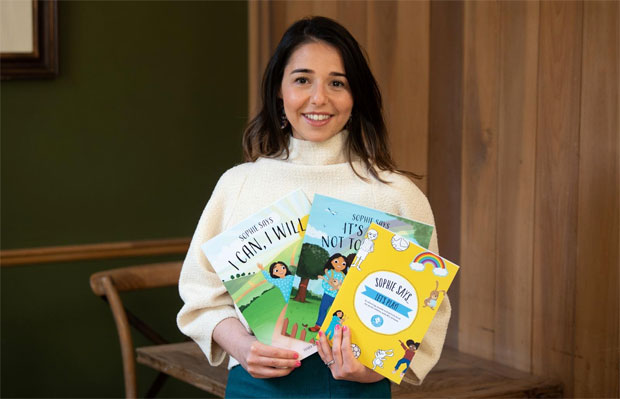How to Boost Your Child’s Confidence & Help Them Express Their Feelings

How to Boost Your Child’s Confidence & Help Them Express Their Feelings
This article about how to boost your child’s confidence was written by Esther Marshall, author of the ‘Sophie Says’ children’s book series.
So many of us were taught growing up that confidence came from other people telling you that you were great. Whilst that does help, if we want to truly build our child’s confidence, we need to help them feel confident from the inside. It needs to come from them and be part of their own narrative that comes from their mind. If they feel confident about themselves, they will feel able to talk to you about their feelings, however they feel. In turn, you will build a confident child and they will be able to build essential skills which will build confidence and resilience and that will help them thrive in their childhood all the way through to adulthood.

6 ways to boost your child’s confidence:
1. Encourage them.
When you’re tired and rushed for time, the natural response is not to encourage your child to do more than they already do. However, if your child is interested in something, providing it’s something which isn’t dangerous or can harm them, then it will go a long way to help encourage them. If they feel encouraged, it will help them learn and try new things. It will help them believe in themselves and in turn it will build their confidence.
2. Model behaviour of loving yourself.
If your children see you being self-deprecating, it becomes part of their narrative and can start to really affect their confidence. If they see you talking about yourself positively both inside and out, it can lead to an increase in confidence. This is on both fronts. Talking positively about appearance but also talking positively about how to be kind. The more they practice this, the more it becomes their norm and the more they feel comfortable in their own skin.
3. It’s okay to make mistakes.
Showing children that you in fact are not perfect and you also make mistakes is one of the most important things you can do in order to build your child’s confidence. This is because, in showing children that you make mistakes, it normalises this as part of their everyday and so they learn that this is a natural part of learning and growing. It also helps them develop new skills and new skills are a vital part of growing confidence.
4. Decision making.
As parents we sometimes think we know best and we need to make all the decisions for our children, but actually it’s the opposite. I’m not talking about the massive choices in life, but the everyday choices they can make, be it potential options for dinner, outings on the weekend or what game to play next. Although these may not seem like big decisions to us, this is empowering children to understand that in life there are decisions to be made and not everything is done for them. This will build their confidence in decision making, which as we know is a daily occurrence for us adults both at work and home and will make them feel more comfortable as they go through their childhood into adulthood.
5. Make change part of their everyday.
Change can be extremely hard for both adults and children. If you make change a part of their everyday or even part of some of their week, it will help not only their confidence, but it will also build resilience and help them in their everyday life.
6. Create new experiences
With the cost-of-living crisis you may think this will be difficult to do, but I’m not talking about holidays or costly museum visits. I’m suggesting getting out and experiencing nature, family, friends etc. All of this will give them life experience and build them up so they feel comfortable in new situations, all allowing them to build their confidence without them even realising it.

5 ways to help your child express their feelings:
1. Ask open questions.
Open questions are ones which require a full answer rather than a closed question which only requires a yes or no answer. For instance, instead of asking “Did you enjoy the activity?” where the child will either say yes or no, ask “What was the best part of the activity?” or “What made you laugh the most during the activity?”.
2. Put all distractions away.
When talking to children about their feelings and how they feel, ensure all other distractions are away. Ensure there are no phones around and no television on. Its better to have 10 minutes with your child being fully present than an hour or more of being distracted in front of them.
3. Talk openly about your own feelings.
This helps children see you role model this behaviour, so it becomes part of the way they grow up. It helps them realise that they don’t have to be happy all the time and that feeling your feelings is healthy. Let them know that you also feel sad and angry sometimes and that is ok.
4. Create a safe space.
If a child doesn’t feel safe, they won’t talk at all, that’s why this is such an important part of getting a child to talk about their feelings. A great activity to try is to create a safe corner or space within your home or at school, where they can go to in order to feel safe to talk. Try creating a corner with some pillows, a blanket and your child’s favourite teddy/blanket and get them to go there when they want to talk about their feelings.
5. Eye contact.
Ensure eye contact with the child but don’t expect them to keep eye contact back. You want to ensure that they always know you are there and for that split second when they look up and want to know you are there, you are fully concentrating on them. You want to ensure they know that they are your priority.

About the author:
Esther Marshall is author of the ‘Sophie Says’ children’s book series which aims to help children make life’s most important lessons fun to learn. She spends her time going to schools to talk to children about how to have a positive mental health. This all came after the tragic death of her younger sister who died by suicide. She has vowed to build a legacy for her sister by educating and empowering young children in the importance of looking after their mental health and recognising how to understand and talk about their feelings. You can find Sophie Says on Instagram here and find out more about the books at www.sophiesaysofficial.com.
Guest Article.




